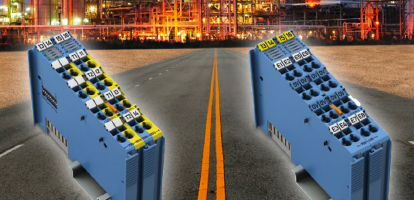

The future of the process industry belongs to both modular systems and increasingly decentralized automation. In many cases, decentralized designs are better suited because continuous processes, which are often be better controlled and scaled, can be built from batch processes by using modularization and miniaturization. Intrinsically safe I/O modules, such as those found in the WAGO-I/O-SYSTEM 750, are the foundation for modular automation in the process industry.
Modular systems will play a central role in the future. Due to miniaturization in individual process technology modules, demanding batch processes can be converted into scalable continuous processes. By supplementing or replacing certain modules, manufacturing firms can react more quickly to the market while simultaneously producing minimum quantities much more efficiently. The efficiency and flexibility found in this type of system design can be further increased — in contrast to current systems and automation hierarchies — if the individual modules can manage their own automation functions. This relieves a substantial burden from the control system, freeing it to regulate its intended function: namely controlling the process, for example, by monitoring formulas and analyzing process data. The actual control takes place decentrally at the modules, which are connected to the control station via a fieldbus system. The modules report to the control system and receive their commands based on their available functions. The implementation of the automation tasks ultimately occurs autonomously. The interface to the field level is formed, as it is currently, by the I/O modules in control.
Sleek Shape, Large Impact
When selecting a suitable system, many criteria must be considered. In planning for increasing modularization — and thus miniaturization — the actual form factor of the modules themselves is as important to consider as other variables such as electrical engineering data, potential environment and the operating conditions. A compact design quickly pays for itself because numerous signals must be processed in the smallest footprint, and the space for controlling the process itself is becoming incredibly valuable.
With installation widths of 12 mm and 24 mm, the intrinsically safe I/O modules from the WAGO-I/O-SYSTEM 750 fulfill these demands. They are among the “blue bloods” of the process industry, and supply controllers with all of the necessary information from the field level. So that two basic worlds — “Ex i” and “Non Ex i” do not require two separate automation systems, the WAGO-I/O-SYSTEM 750 enables both to reside in the same node; “Ex i” and “Non Ex i” modules can be operated together on one PLC. Although the two I/O types can be distinguished within a node by white and blue module housings, their unique functionalities share the same foundation.
Reliable and Certified
In particular, certification for installation in Zone 2 (ATEX/IECEx/ ANSI/ISA) and in an Ex-d housing or in pressurized Ex-p housing, make the WAGO-I/O-SYSTEM a highly flexible solution. From pressure transmitters to a position controller, field devices are directly connected without additional units such as Zener barriers or isolation amplifiers. The entire system is also certified for use worldwide by authorities including: ABS (American Bureau of Shipping, BV (Bureau Veritas), DNV (Det Norske Veritas), GL (Germanischer Lloyd), KR (Korean Register of Shipping), LR (lloyds Register), NKK (Nippon Kaiji Kyokai), PRS (Polski Rejestr Statkow) and RINA (Registrato Italiano Navale) among others.
Satisfying the requirements for these strict maritime certifications also guarantees important advantages to the process industry such as high vibration resistance and greater resistance to electrostatic discharges (ESD), voltage surges and low frequency interference. A larger voltage fluctuation range, from -25 % to +30 %, ensures additional safety. In almost every maritime test, the system being evaluated must function without fault both during and after the test to meet evaluation criterion A. In the industrial sector, in contrast, evaluation criterion B is overwhelmingly preferred: in this case, the system only has to function error-free after the test.
In addition to comprehensive certification, project designers also want a system that supports international fieldbus standards, like PROFIBUS DP, Modbus, TCP/UDP, Modbus RTU or CANopen. Both criteria are important in order to globally standardize the design of process modules, which then facilitates data exchange. Due to the fieldbus-independent design of the WAGO-I/O-SYSTEM, all relevant protocols are supported. In the case of the PFC200 Controller, they are even united into a single device — including web visualization.
Text: Benjamin Boehm, WAGO
Photo: Fotolia, WAGO